Contents
Market Overview
Risk sentiment traded softly as the U.S. President contracted coronavirus. We can expect more trepidation until the severity of Trump’s condition is known, which could risk postponing the election campaign and debates temporarily. However, extending this anxiety to the election date is at least premature for now. Nevertheless, flailing stimulus talks have reached an impasse, the first debate was chaotic, macro developments were thin aside from the NFP beat and technical glitches with Japan’s equity indices were exacerbated by the broader illiquidity in Asia. U.S. equities remained under pressure for most of September (Nasdaq -5.2%, S&P -3.9% & Dow -2.3%), with U.S. rates steepening as duration remained soft. Through September, EM Sovereign Credit ended -1.9% but up +2.3% through 3Q, with EM Corporate Credit only down -0.5% on the month but up +2.7% over the prior quarter. Importantly, EM credit markets have displayed better risk-adjusted returns through the volatility and outperformed US IG and HY rather comfortably. Technicals in September remained buoyant with inflows of $3.7bn in EM Hard Currency, which comes as primary markets added a further $79bn, taking the YTD issuance figure to a record-breaking $582bn. Indeed, Egypt issued Africa’s first benchmark green bond which flags an ongoing trend, which is now extending to HY issuers. Returns this week for EM were positive (up 0.3%), driven by Ecuador, Tunisia and Suriname, as Lebanon, Zambia and Sri Lanka lagged the broader market. Into next week with the end of Golden Week, we can expect to see Chinese FX reserves with M2 validating credit extension trends. This will then be followed by a slew of inflation prints with Brazil, Chile, Colombia, Philippines and Turkey standing out as key events. Rate decisions out of Poland and Peru should be benign, while CB minutes out of Mexico may provide further insight into dissenting voters seeking more after the 25bp cut a fortnight ago.
Fixed Income
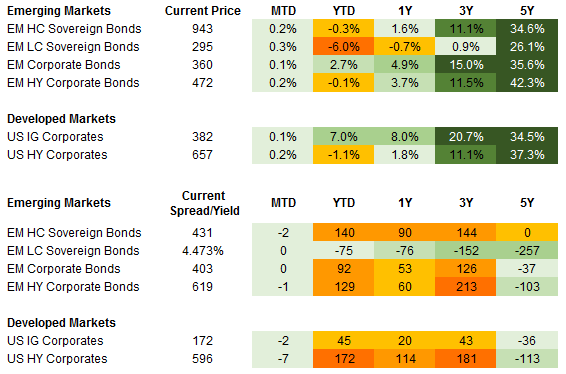
Equities
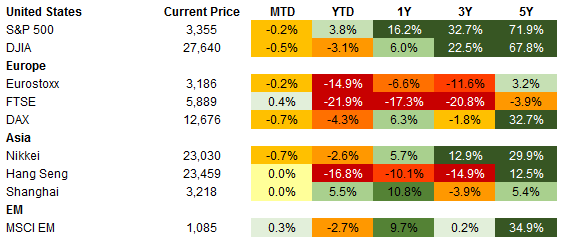
Commodities

Source for data tables: Bloomberg, JPMorgan, Gramercy. EM Fixed Income is represented by the following JPMorgan Indicies: EMBI Global, GBI-EM Global Diversified, CEMBI Broad Diversified and CEMBI Broad High Yield. DM Fixed Income is represented by the JPMorgan JULI Total Return Index and Domestic High Yield Index. Fixed Income, Equity and Commodity data is as of October 2, 2020 (Mid Afternoon).
Emerging Markets Weekly Highlights
The IMF calls for reform of the international debt architecture and 12-month extension of the G20 Debt Service Suspension Initiative (DSSI); Nagorno-Karabakh frozen conflict escalates into open war between Armenia and Azerbaijan, further focusing the market spotlight on geopolitical risks for Turkey and Russia; Failure of government formation efforts pushing Lebanon closer to the brink; Mexico’s pension bill submitted to congress this week is neutral to positive for the financial sector; Global emerging market corporates in focus: Blurred lines – What makes a bank?
The IMF calls for reform of the international debt architecture and a 12-month extension of the G20 Debt Service Suspension Initiative (DSSI)
Event: The IMF First Deputy Managing Director, Geoffrey Okamoto, gave a speech at the Peterson Institute for International Economics Conference this week which urged countries and creditors to tackle debt vulnerabilities now and all stakeholders to improve the existing architecture for a sovereign debt resolution. Okamoto stated that the DSSI needs to be extended ‘ideally for another 12-months’ in order to prevent countries from having to resume debt service at the expense of fighting the pandemic. The Fund’s report on the topic suggests broader use of Collective Action Clauses (CACs), anti-vulture fund legislation, and state-contingent instruments. It also addresses potential amendments to IMF and IFI policies to facilitate deals, particularly in crisis scenarios, and further efforts to boost transparency.
Gramercy commentary: As outlined in our paper ‘Emerging Markets Debt Relief and The Paradigm of Non-Payment’, we have been of the view that the global liquidity and debt relief efforts in relation to the COVID-19 global crisis would be insufficient for select sovereigns (those that entered the crisis with very weak balance sheets, limited fiscal and monetary space, and insufficient external buffers), and require more comprehensive debt restructurings with private sector involvement (PSI). While the IMF’s call for an extension of the DSSI increases pressure for PSI, we still do not believe this will be a mandatory ‘one-size fits all’ approach as it would be too difficult to obtain widespread buy-in and there is no clear mechanism in which this can easily be done. However, rising default risk combined with improvements to the tools as outlined by the IMF’s report, including IFI cash or credit enhancements, lending conditionality, or state-contingent features (GDP-linked bonds, natural disaster clauses, etc.), may help to incentivize private creditor involvement (and lower associated opportunity costs and downside risks for sovereigns. Transparency supportive tools which subordinate undisclosed debts would also be beneficial in broadening the scope for PSI.
Nagorno-Karabakh frozen conflict escalates into open war between Armenia and Azerbaijan, further focusing the market spotlight on geopolitical risks for Turkey and Russia
Event: Renewed tensions between Armenia and Azerbaijan over the Nagorno-Karabakh territory have escalated as Armenia alleges Turkey shot down one of its fighter jets this week, a claim Turkey has denied. While the conflict is directly between the post-soviet republics of Armenia and Azerbaijan, it also has broader implications for relations between two regional powers: Turkey and Russia.
Gramercy commentary: Nagorno-Karabakh’s sovereignty has been disputed for decades, starting in 1992, when the ethnic-Armenian population declared independence from Azerbaijan and set off a two-year war between the two countries. From a regional perspective, Turkey has historically supported Azerbaijan, a majority-Muslim country, while Russia has a collective security agreement with Armenia. Thus far, Turkey is reportedly considering sending troops in support of Azerbaijan and has denounced international calls for a ceasefire. On the other hand, Russia, who also has a strong relationship with Azerbaijan, seems to hold the key to deescalating the conflict. We continue to monitor Russia’s efforts to calm the tensions as well as the potential impact that an escalation in the conflict could have on the region. Beyond the negative impact on Armenia and Azerbaijan’s sovereign bond curves, the military conflict in Nagorno-Karabakh has important credit implications for Russia and Turkey. Both major EM issuers are prone to elevated geopolitical risks that tend to contribute significant risk premium to their market instruments in episodes of geopolitical flare-ups. In that context, the resurgence of hot conflict in the Caucasus adds to already high geopolitical risk premia embedded in Russian and Turkish assets, related to the U.S. elections and poisoning of opposition leader Alexei Navalny (in the case of Russia) and tensions with Greece and the EU over maritime territorial claims in the East Mediterranean (in the case of Turkey).
Failure of government formation efforts pushing Lebanon closer to the brink
Event: Lebanon’s Prime Minister-designate, Mustapha Adib, quit this week after a month of unsuccessful attempts to find a workable solution for forming a new government within the country’s notoriously complex sectarian-based political system.
Gramercy commentary: When we commented in early September on Adib’s appointment, we were correct (unfortunately) in predicting that government formation was likely to face significant challenges, despite some initial constructive signals. As Adib’s resignation indicates, the process has indeed encountered unsurmountable obstacles over the near-term, related to internal political calculations by Lebanon’s main parties as well as regional and global geopolitical factors. The political stalemate brings the country, already severely battered by economic, social and humanitarian crises not seen since the days of the brutal civil war that ended in 1990, closer to the brink. In the midst of a global pandemic and an economic situation that is spiraling out of control, it was important for Lebanon to install a government as soon as possible that could potentially unlock sizable foreign financial support from bilateral and multilateral sources. In the absence of a sitting government, the necessary reforms and effective negotiations with key external stakeholders such as France (President Macron has been the leading force in international efforts to support Lebanon) and the IMF are practically out of question. With the prospect of an even sharper economic collapse ahead and the country’s highly complex sectarian social fabric, the risk of material political violence and instability is not negligible, evoking the specter of a “failed state”. One way or another, some sort of reset of the existing political and economic system appears to be unavoidable due to its failure to address the country’s profound challenges as indicated yet again by the government formation failure this week. However, for the time being, the deep reforms required to address the key underlying structural problems appear highly unlikely due to the entrenched political class’ unwillingness to embrace reforms. Negotiations with the IMF and the international community on a potential bailout package as well as talks with private creditors on a sovereign debt restructuring will remain frozen. Meanwhile, ongoing rapid and severe deterioration in economic fundamentals will negatively affect investors’ recovery value analysis, putting downward pressure on market assets and further clouding the outlook for the economy and the financial system.
Mexico’s pension bill submitted to congress this week is neutral to positive for the financial sector
Event: Mexican President, Andres Manuel Lopez Obrador (AMLO), submitted a proposal for changes to the pension system to the lower house of congress earlier this week. The proposal includes three key changes: 1) increase in employer contributions to workers’ individual accounts from 6.5% to 15% starting in 2023, 2) reduction in the number of work weeks required to receive employment insurance from 1,250 to 1,000, and 3) increased guaranteed minimum pension for retirees who are eligible for old-age and unemployment benefits, but lack the funds in their individual account. The bill also includes proposed limits on the commissions that pension funds can charge. Funds would be limited to the average commission of funds in Chile, the U.S., and Colombia. Mexican commissions currently average 0.92% relative to an average of 0.54% in Chile, the U.S., and Colombia.
Gramercy commentary: The changes proposed are relatively benign, despite initial concerns that AMLO may try to increase state control over the pension system or force pensions to invest in infrastructure to support his domestic policy. As such, we view the proposed pension changes as neutral for Mexican assets and credit sentiment at this juncture. This contrasts with more negative pension reform taken by regional peers Peru and Chile, where changes to allow early withdrawals pose downside risks to domestic market depth and public finances, particularly if the trend continues.
Global emerging market corporates in focus: Blurred lines – What makes a bank?
Event: In September, Yandex, a technology and internet services company in Russia, disclosed that an agreement in principle had been reached to acquire TCS Group, an online retail financial services company which has a regulated lender, Tinkoff Bank, at its core. At the time of the disclosure, the potential consideration totalled almost US$5.5 billion in cash and shares.
Gramercy commentary: TCS Group (or Tinkoff) is far from a typical bank. It is fully online and 70% of the employees at its headquarters are IT specialists. Having said that, the potential merger with a technology company may have interesting implications for other emerging market lenders. First, the transaction may further blur the lines defining what makes a bank. This ‘dilemma’ is not a new one, of course. Technology, retail and other non-financial companies sometimes offer similar services to banks. In at least one jurisdiction, authorities are seeking to increase oversight of these financial services and are imposing requirements on such companies, which may impact returns generated from the financial services offered. Secondly, many banks around the world are currently subject to dividend and share buyback restrictions, making it somewhat more difficult to be a bank. For equity investors, it may be preferable to be positioned as a technology company (or any other non-financial issuer) rather than a bank in the current environment. Shareholders and management may well seek similar transactions if the Yandex-TCS Group merger closes. Thirdly, while the move away from traditional bricks and mortar banking was well under way before the COVID-19 pandemic, it’s clear that lockdown measures have catalyzed this change. With customers increasingly using online services, banks have invested in digital solutions to meet clients’ needs. Some lenders have spoken about spinning off their digital banking businesses. The potential Yandex-TCS Group transaction raises the prospect of such businesses being sold to technology companies, rather than listed. Notwithstanding all this, some form of regulation or oversight is probably best for institutions which accept deposits and extend loans. Such oversight comes with requirements covering capital, liquidity and a myriad other measures. There are financial and other costs associated with regulation which may limit the read across of the potential transaction in Russia for other emerging market lenders.
Emerging Markets Technicals
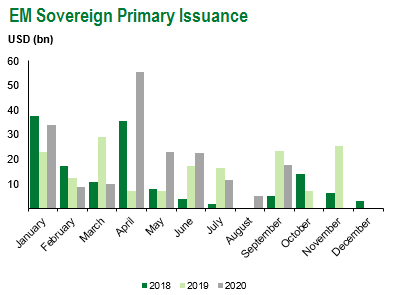
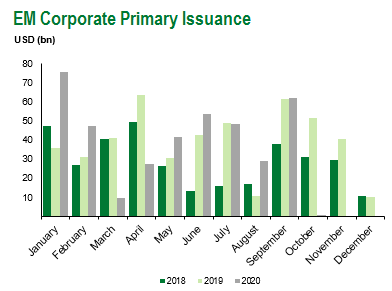
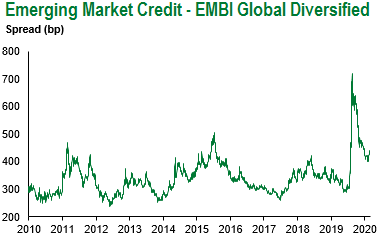

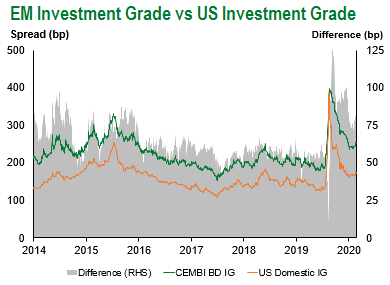
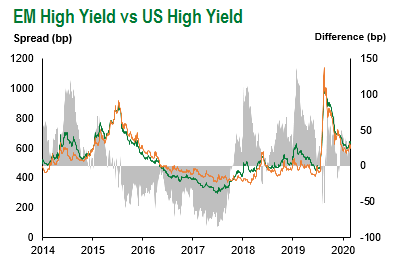
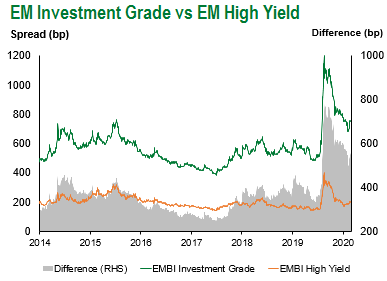
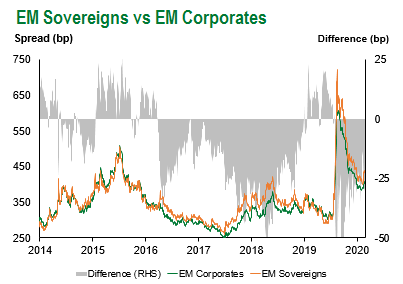
Emerging Markets Flows
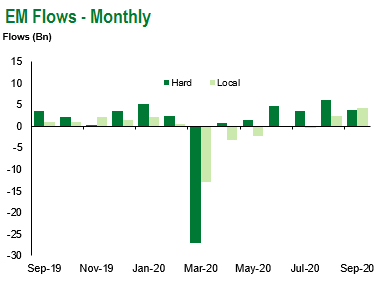
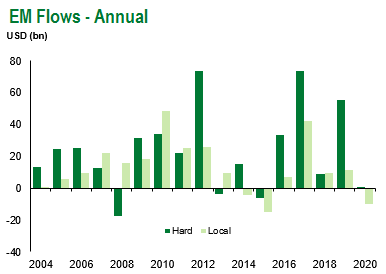
Source for graphs: Bloomberg, JPMorgan, Gramercy. As of October 2, 2020.
COVID Resources
Emerging Markets COVID-19 Case Summary
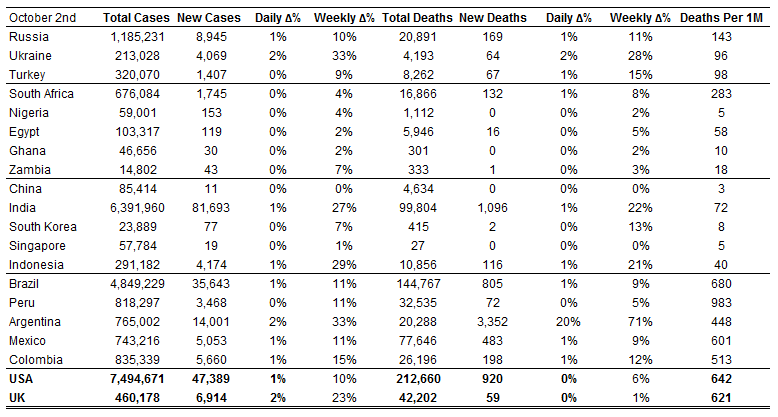
Source: Worldometer as of October 2, 2020.
Additional Crisis Resources:
Johns Hopkins COVID-19 Case Tracker
For questions, please contact:
Kathryn Exum, Senior Vice President, Sovereign Research Analyst, [email protected]
Petar Atanasov, Senior Vice President, Sovereign Research Analyst, [email protected]
Tolu Alamutu, Senior Vice President, Corporate Research Analyst, [email protected]
James Barry, Vice President, Corporate Research Analyst, [email protected]
This document is for informational purposes only. The information presented is not intended to be relied upon as a forecast, research or investment advice, and is not a recommendation, offer or solicitation to buy or sell any securities or to adopt any investment strategy. Gramercy may have current investment positions in the securities or sovereigns mentioned above. The information and opinions contained in this paper are as of the date of initial publication, derived from proprietary and nonproprietary sources deemed by Gramercy to be reliable, are not necessarily all-inclusive and are not guaranteed as to accuracy. This paper may contain “forward-looking” information that is not purely historical in nature. Such information may include, among other things, projections and forecasts. There is no guarantee that any forecasts made will come to pass. Reliance upon information in this paper is at the sole discretion of the reader. You should not rely on this presentation as the basis upon which to make an investment decision. Investment involves risk. There can be no assurance that investment objectives will be achieved. Investors must be prepared to bear the risk of a total loss of their investment. These risks are often heightened for investments in emerging/developing markets or smaller capital markets. International investing involves risks, including risks related to foreign currency, limited liquidity, less government regulation, and the possibility of substantial volatility due to adverse political, economic or other developments. The information provided herein is neither tax nor legal advice. Investors should speak to their tax professional for specific information regarding their tax situation.